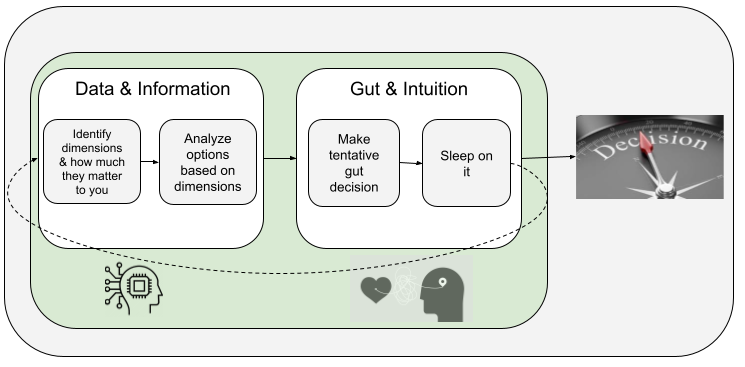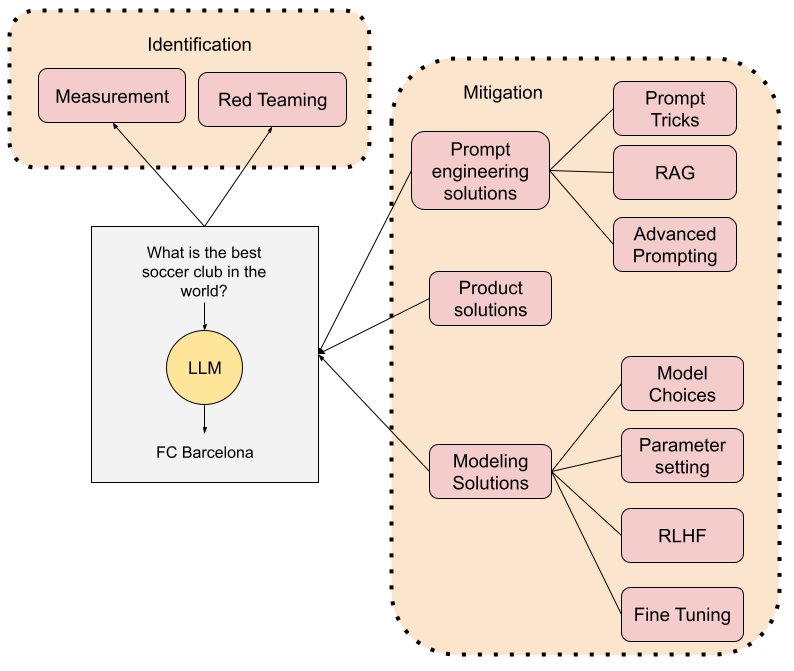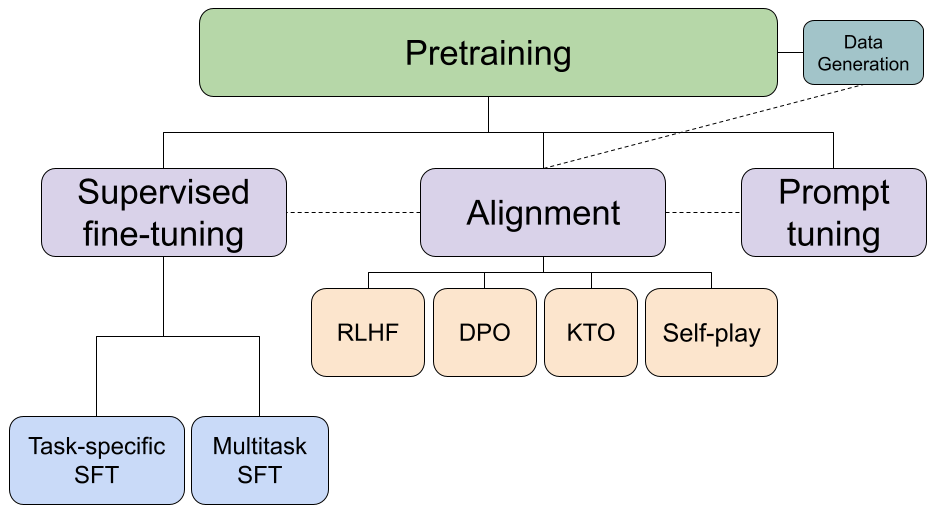(Sorry for allowing myself to depart from the usual geeky computer science algorithmic talk in this blog. I owed it to myself and my biggest hobby to write a post like this. I hope you bear with me.)
Around 3 years ago, I smoked, I was overweight, and only exercised occasionally. Being a fan of radical turns in my life, I decided one day to go on a week-long liquid diet, I stopped smoking, and I took up running, with the only goal in my mind to some time run the half marathon in my home town. Little did I know that the decision to run would change my life in so many ways. This last year 2012, I have run 3 marathons, 4 half marathons, and a 199 mile relay with a team of 12. But, beyond that, I am convinced that I owe part of my personal and professional success these past years to the fact that I am a runner.
This post is my little homage to running and to the many lessons I have found in my journey.
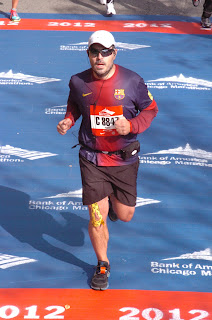 |
When I started running I had lots of problems. The main one was due to an old knee injury that hit back on me. I had an ACL surgery when I was 16, and ever since my right knee has not been the same. When my knee started hurting this time, I visited several doctors, some specialized in sports. All of them recommended I should give up running. Some told me straight out that I would never be able to run a marathon. It took me lots of visits to the chiropractor, and lots of quads exercises over months to get back to running. But, I overcame these initial hurdles, and went into running not one but several marathons.
Lesson 1. Beginnings are hard: Starting anything new in life will be hard. You will need to invest lots of energies, and at times you will want to give up. The more important and significant the change is, the more it will take from you.
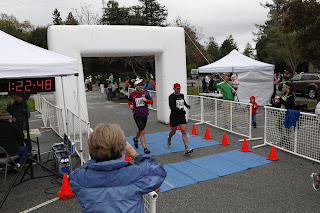 |
After I finished my first marathon in Santa Cruz, and when I thought all my knee problems were long gone, my knee started hurting again. This was nothing like what I had experienced when starting. Still, it could have been enough to stop me from trying again. But, it didn’t. I focused on recovering. Soon I was back on the road.
Lesson 2. There will be ups and downs: Once you have overcome the initial difficulties in starting something
new, you will be tempted to think that everything else should be easy . But, life, like most running courses, will have hills with ups
and downs.
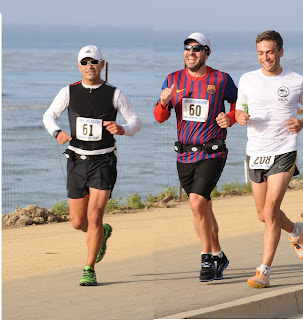 |
It is hard to wake up at 6 am for the morning run. It is easy to stay in bed when your legs are still sore from yesterday’s training. It is tough to go out running when it is raining or freezing outside. It is even harder to decide not to stop when you hit the wall on mile 20 of a marathon. All these day to day small decisions end up adding up and making the difference between you improving and accomplishing your running goals.
Lesson 3. The importance of those small decisions: The small day to day decisions play a huge role in building your character. They will end up determining your long term success and the direction your life takes.
 |
When you are not at your best, it is even harder to face all these small decisions I mentioned. If you are down for some time because of an injury, it is tough to start again on your own. Having a group of friends that share your passion for running is extremely important. I am fortunate to have a large group of friends that push me to become better, and help me get up when I fall.
Lesson 4. You are not alone – the power of social influence… and friends: Whatever new adventure you start in life, it is important to have people around you that understand and support it. People that share your passion can make a difference when you need it.
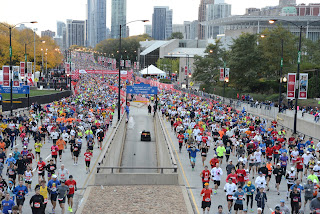 |
As much as I have appreciated having that extra support from friends and other fellow runners, there are many times I have felt the pressure of having to make a decision on my own. Many of those small decisions such as getting up off bed on a rainy day, for example. Nobody is going to make them for you. I have also felt alone in many of my training runs. And, of course, in mile 20 of a marathon, when everyone is giving their best but you can only see strangers around you. In all those moments it is important to be strong and be ready to carry on, on your own.
Lesson 5. But, you will be alone: No matter how many friends support you, you will have to face important decisions on your own, and carry your own weight.
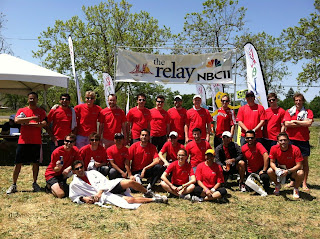 |
It is well known that “repetition leads to mastery”. This is even more so for activities that require developing physical strength and resistance. There is no other secret to becoming a better runner than to run, and run often. Putting on more miles is the goal. Everything else will come.
Lesson 6. Repeat, repeat, repeat, repeat: Repetition is the key to mastering most things in life. If you want to become good at doing something, ask yourself how you can invest thousands of hours in it (read about the 10k hour rule in Malcolm Gladwell’s Outliers).
 |
As much as repetition is needed to improve, it is hard to do so without a goal in mind. During my time running I have learned the power of having concrete goals. Setting up goals that are achievable in the long run, but not too easy to get to. As I have progressed, I have learned to be more demanding. My current goals is to do a 3:30 marathon, and a 1:30 half. The first one is achievable, the second one will need much more work. But these goals will keep me going and focused for some time.
Lesson 6. Set your goals: Setting ambitious but achievable goals in life will help you push harder and will keep you focused and looking forward.
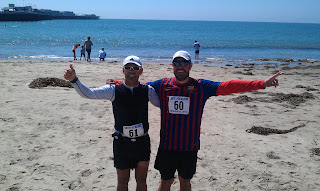 |
When I look back at the way I started running, I realize how many things I did wrong. I have learned so much since then. I have read books, watched movies and online videos, talked to people that know much more than I do. I have also learned from looking at the data that I generate from each of my trainings. I have also learned to listen to and understand my body I am fortunate enough that I love learning, and I have enjoyed every bit of this learning experience.
Lesson 7. Data and knowledge: Use all the information around you to improve your life. Data about you can give you insights into how to become better. And any knowledge you gain from external sources can make a difference when taking a decision.
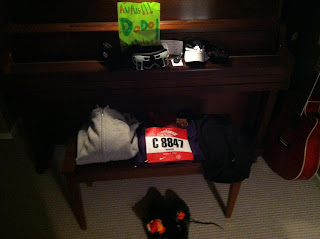 |
One of the reasons why beginnings are hard (Lesson 1) is that people that start running tend to overdue it by, for example, increasing distance and pace at the same time. This typically leads to injury, and frustration. One of the most important things to learn when starting to run is to understand your own limitations. Even when you do, you will be tempted to push to hard by continuing to run when your leg hurts, or by doing one too many races in a short period. I have done all of the above. But it is important to remember that everyone has their limits and forcing beyond them can result in long term problems.
Lesson 8. Everyone has their limits: Pushing yourself hard is good. However, there is such a thing as pushing *too* hard. You need to understand where your limits are to push them further, but only little by little.
 |
No matter how hard it can get at some points, no matter how long it can take you, there is no doubt that you can do whatever you set your mind to. I don’t have any special conditions for running, and I have never had. I don’t think I will ever be a “great” runner. However, now I look back and laugh when I remember my unreachable goal a little over 3 years ago was “only” to run a half marathon. If someone like me, with little or no pre-existing conditions, family and work obligations, and very little time, can do it, so can you.
Lesson 9. But, yes you can: No matter how low you fall or how far your goal is, you can do it. Only think about the many people just like you who have done it before (e.g. Estimates are that around 0.1 to 0.5% of US Population has completed a Marathon). Why should you be any less?
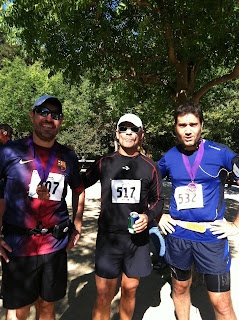 |
As a conclusion, let me stress that the fact anyone can run does not mean that running is easy, and it requires no effort. It is precisely the fact that it is hard and requires effort for a long period of time what makes it worthwhile. Like most good things in life.
Lesson 10. All good things come hard: Think about it, all worthy things in life require effort and dedication. Being healthy, fit, happy, having a career, or a family, they all require your energy and long time investment. Just go with it, and enjoy every bit of the journey.
